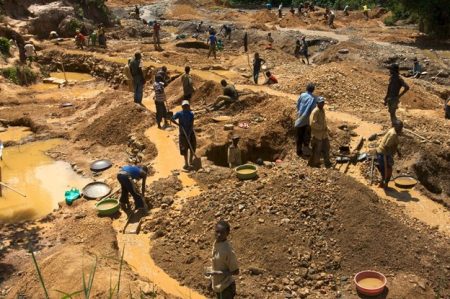 16 May 2014, Sweetcrude, Port Harcourt – In the 18th and 19th centuries, European statesman like Disraeli, Lord Salisbury, Gladstone and Otto Von Bismarck deployed robust diplomacy through the Treaty of Paris 1856, the treaty of San Stefano, also known as the Treaty of Peace 1878, the Treaty of Berlin, 1878 and the treaty of London, 1913 to placate the Eastern Question, a perennial conundrum that Western Europe recognised as having the potential to undermine the gains and civilisation of the European People. In the core of the Eastern Question was the tendency by Russian leaders to spread Russian influence over the Caucasus and indeed all of the Balkan Region and possibly into the reaches of Western Europe. In the 18th Century Russia invaded Poland, not for the first or second time and carved out two principalities out of it. Following the Communist Revolution of 1917, Russian policy makers brought nearly the whole of the Balkan Region under Russian control through “voluntary” constitutions adopted by the confederate countries in 1924, 1936 and 1977.
16 May 2014, Sweetcrude, Port Harcourt – In the 18th and 19th centuries, European statesman like Disraeli, Lord Salisbury, Gladstone and Otto Von Bismarck deployed robust diplomacy through the Treaty of Paris 1856, the treaty of San Stefano, also known as the Treaty of Peace 1878, the Treaty of Berlin, 1878 and the treaty of London, 1913 to placate the Eastern Question, a perennial conundrum that Western Europe recognised as having the potential to undermine the gains and civilisation of the European People. In the core of the Eastern Question was the tendency by Russian leaders to spread Russian influence over the Caucasus and indeed all of the Balkan Region and possibly into the reaches of Western Europe. In the 18th Century Russia invaded Poland, not for the first or second time and carved out two principalities out of it. Following the Communist Revolution of 1917, Russian policy makers brought nearly the whole of the Balkan Region under Russian control through “voluntary” constitutions adopted by the confederate countries in 1924, 1936 and 1977.
The provision that each Republic could secede at its own will was never tested for fear in the Republics of “the Siberian treatment,” the Russian gulags and the loss of Russian protection which portended a vast array of negative developments for an “errant” Republic. Historians record that among a long list of factors, the collapse of the communist style economy and the ascendancy of a liberal to the highest office of the Kremlin, Mikhail Gorbachev brought about the disintegration of the communist behemoth, the USSR as well the whittling of Russian influence, not only in the Balkan, or the Caucasus but also on the world stage. Glasnost and Perestroika, the social and economic programmes deployed by Gorbachev to attenuate the stranglehold of communism on the USSR were hailed in the West but for the Soviet apparatchik, they were on anathema.
With the disintegration of the Soviet Union, Russia became just another country, poor, and disdained by the free world and her former “vassals” as a pretentious world power. It was in this scenario that Vladimir Putin, a former KGB operative stationed in East Germany came to power. Putin’s lodestone, according to Marcel K. Van Herpen, the author of “Putinism, the Slow Rise of a Radical Right Regime in Russia,” is to regain Russia’s lost glory on the world stage and to regain Russia’s “lost territories.”
There is ample evidence that Van Herpen is not exaggerating. Putin has attached Moldova; in August 2008, Putin attacked Georgia in the famous five day war involving Georgia, Russia and the separatist South Ossetia and Abkhazia. Russian argument for joining the fray, which it has advanced to justify its involvement in other conflicts according to Polish Foreign Minister, Radoslav Sikorski, was protection for ethnic minorities. Political scientists and historians argue that the political history of the Caucasus and indeed the Balkan region is such that it is impossible not to have ethnic minorities of a nationality in countries that are predominantly populated by another ethnic group. Russia’s most recent annexation of the Crimean Region, a semi-autonomous principality under Ukrainian sovereignty offends Article 2 Paragraph 4 of the United Nations Charter as well as the spirit and letter of Resolution 242 passed by the Security Council of United Nations on November 22, 1967 following the Six-Day war in the Middle East, a Resolution that was supported and voted for by Russia.
The world is outraged by Russia’s invasion of Ukrainian territory. From Washington to Warsaw, from Vancouver to Vienna and from London to Libreville, there is congruence that Russia should be isolated economically and diplomatically. However, European powers have had to tread cautiously over the Russian Question for the simple reason that from Belfast to Berlin, dependence on Russian gas ranges from 20% to 40% to 60% and as much as to 80% (for Germany).
The whole essence of this discourse is that there is currently a scramble for the European gas market, a scramble which Nigerian authorities have failed to recognise and strategise over for participation. Frustrated and forced into a position of ambivalence over Russia’s breach of international law, European countries met in Brussels, March 20 to discuss how to shore up its energy security, a euphemism for reducing or totally removing its energy dependence on Russia. Already the EU has backed a new link, the Trans Adriatic Pipeline, to import Azeri gas and has already improved infrastructure to pump gas to Ukraine from the EU instead of the current situation, which is the reverse. As ambitious as these plans are, the EU lacks one thing to complete these lofty plans: Gas! Nigeria enjoys an abundance of gas deposits and although Russia enjoys nearness to Western European Markets (the distance between Moscow and London is 2508 km while the distance between Lagos and London is 5, 541.6 km), the possibility of the economic isolation of Russia as well as the fact that Nigeria can establish a Mediterranean hub which can be supplied on a daily basis by ships chugging from the Atlantic into the Mediterranean with gas supplies, is reason enough for Nigeria’s gas marketers to start developing a strategy along the lines of the suggested hub. With the construction of a well supplied gas hub on the coast of the Mediterranean, Nigeria can participate not only in a burgeoning gas market, but by also playing a sensitive role in the politics of the 21st century world by assisting in the efforts to tame the Russian invader.



